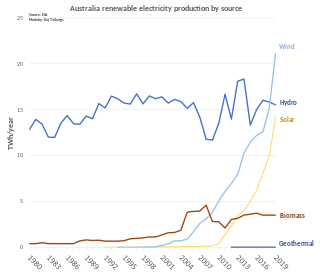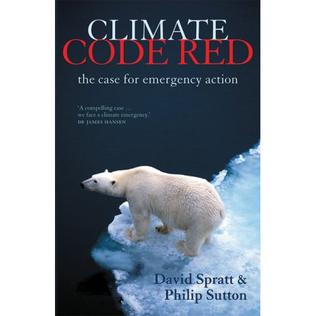Carbon neutrality is a state of net zero carbon dioxide emissions. This can be achieved by reducing emissions, most of which come from the burning of fossil fuels, and by removing carbon dioxide from the atmosphere. The term is used in the context of carbon dioxide-releasing processes associated with transport, energy production, agriculture, and industry.

The City of Merri-bek is a local government area in metropolitan Melbourne, Australia. It comprises the inner northern suburbs between 4 and 11 kilometres from the Melbourne CBD. The Merri-bek local government area covers 51 km2 (20 sq mi), and in June 2018, it had a population of 181,725.

The Climate Group is a non-profit organisation that works with businesses and government leaders around the world to address climate change. The Group has programmes focusing on renewable energy and reducing greenhouse gas emissions. Launched in 2004, the organisation operates globally with offices in the UK (headquarters), the United States and India.

Carbon accounting is a framework of methods to measure and track how much greenhouse gas (GHG) an organization emits. It can also be used to track projects or actions to reduce emissions in sectors such as forestry or renewable energy. Corporations, cities and other groups use these techniques to help limit climate change. Organizations will often set an emissions baseline, create targets for reducing emissions, and track progress towards them. The accounting methods enable them to do this in a more consistent and transparent manner.

The energy policy of the European Union focuses on energy security, sustainability, and integrating the energy markets of member states. An increasingly important part of it is climate policy. A key energy policy adopted in 2009 is the 20/20/20 objectives, binding for all EU Member States. The target involved increasing the share of renewable energy in its final energy use to 20%, reduce greenhouse gases by 20% and increase energy efficiency by 20%. After this target was met, new targets for 2030 were set at a 55% reduction of greenhouse gas emissions by 2030 as part of the European Green Deal. After the Russian invasion of Ukraine, the EU's energy policy turned more towards energy security in their REPowerEU policy package, which boosts both renewable deployment and fossil fuel infrastructure for alternative suppliers.

A low-carbon economy (LCE) or decarbonised economy is an economy based on energy sources that produce low levels of greenhouse gas (GHG) emissions. GHG emissions due to human activity are the dominant cause of observed climate change since the mid-20th century. Continued emission of greenhouse gases will cause long-lasting changes around the world, increasing the likelihood of severe, pervasive, and irreversible effects for people and ecosystems. Shifting to a low-carbon economy on a global scale could bring substantial benefits both for developed and developing countries. Many countries around the world are designing and implementing low-emission development strategies (LEDS). These strategies seek to achieve social, economic, and environmental development goals while reducing long-term greenhouse gas emissions and increasing resilience to the effects of climate change.

Mark Diesendorf is an Australian academic and environmentalist, known for his work in sustainable development and renewable energy. He currently teaches environmental studies at the University of New South Wales, Australia. He was formerly professor of environmental science and founding director of the Institute for Sustainable Futures at the University of Technology, Sydney and before that a principal research scientist with CSIRO, where he was involved in early research on integrating wind power into electricity grids. His most recent book is Sustainable Energy Solutions for Climate Change.

Renewable energy in Australia includes wind power, hydroelectricity, solar photovoltaics, heat pumps, geothermal, wave and solar thermal energy.

Greenhouse Solutions with Sustainable Energy is a 2007 book by Australian academic Mark Diesendorf. The book puts forward a set of policies and strategies for implementing the most promising clean energy technologies by all spheres of government, business and community organisations. Greenhouse Solutions with Sustainable Energy suggests that a mix of efficient energy use, renewable energy sources and natural gas offers a clean and feasible energy future for Australia.

Climate change in Australia has been a critical issue since the beginning of the 21st century. Australia is becoming hotter and more prone to extreme heat, bushfires, droughts, floods, and longer fire seasons because of climate change. Climate issues include wildfires, heatwaves, cyclones, rising sea-levels, and erosion.

Professor Ross Garnaut led two climate change reviews, the first commencing in 2007 and the second in 2010.

Climate Code Red: The Case for Emergency Action is a 2008 book which presents scientific evidence that the global warming crisis is worse than official reports and national governments have so far indicated. The book argues that we are facing a "sustainability emergency" that requires a clear break from business-as-usual politics. The authors explain that emergency action to address climate change is not so much a radical idea as an indispensable course we must embark upon. Climate Code Red draws heavily on the work of a large number of climate scientists, including James E. Hansen.
Greenhouse gas emissions by Australia totalled 533 million tonnes CO2-equivalent based on greenhouse gas national inventory report data for 2019; representing per capita CO2e emissions of 21 tons, three times the global average. Coal was responsible for 30% of emissions. The national Greenhouse Gas Inventory estimates for the year to March 2021 were 494.2 million tonnes, which is 27.8 million tonnes, or 5.3%, lower than the previous year. It is 20.8% lower than in 2005. According to the government, the result reflects the decrease in transport emissions due to COVID-19 pandemic restrictions, reduced fugitive emissions, and reductions in emissions from electricity; however, there were increased greenhouse gas emissions from the land and agriculture sectors.

A zero-carbon city is a goal of city planners that can be variously defined. In a narrower sense of energy production and use, a zero-carbon city is one that generates as much or more carbon-free sustainable energy as it uses. In a broader sense of managing greenhouse gas emissions, a zero-carbon city is one that reduces its carbon footprint to a minimum by using renewable energy sources; reducing all types of carbon emissions through efficient urban design, technology use and lifestyle changes; and balancing any remaining emissions through carbon sequestration. Since the supply chains of a city stretch far beyond its borders, Princeton University's High Meadows Environmental Institute suggests using a transboundary definition of a net-zero carbon city as "one that has net-zero carbon infrastructure and food provisioning systems".
Beyond Zero Emissions (BZE) is an Australia-based, internationally recognised climate change solutions think-tank. The organization produces independent economic and public policy research on the transition of advanced economies to a zero emissions model. Beyond Zero Emission's stated research aims are to provide detailed pathways for a rapid transition in each major sector of Australia’s economy. The organisation is funded by donations from individuals and charitable trusts including the Lord Mayor’s Charitable Foundation and the Hamer Family Fund.

The climate change policy of the United States has major impacts on global climate change and global climate change mitigation. This is because the United States is the second largest emitter of greenhouse gasses in the world after China, and is among the countries with the highest greenhouse gas emissions per person in the world. In total, the United States has emitted over 400 billion metric tons of greenhouse gasses, more than any country in the world.

Climate change in Europe has resulted in an increase in temperature of 2.3 °C (2022) in Europe compared to pre-industrial levels. Europe is the fastest warming continent in the world. Europe's climate is getting warmer due to anthropogenic activity. According to international climate experts, global temperature rise should not exceed 2 °C to prevent the most dangerous consequences of climate change; without reduction in greenhouse gas emissions, this could happen before 2050. Climate change has implications for all regions of Europe, with the extent and nature of impacts varying across the continent.
The history of climate change policy and politics refers to the continuing history of political actions, policies, trends, controversies and activist efforts as they pertain to the issue of global warming and other environmental anomalies. Dryzek, Norgaard, and Schlosberg suggest that critical reflection on the history of climate policy is necessary because it provides 'ways to think about one of the most difficult issues we human beings have brought upon ourselves in our short life on the planet’.

The European Green Deal, approved in 2020, is a set of policy initiatives by the European Commission with the overarching aim of making the European Union (EU) climate neutral in 2050. The plan is to review each existing law on its climate merits, and also introduce new legislation on the circular economy, building renovation, biodiversity, farming and innovation.

Climate Emergency is being declared in Australia similarly to many other jurisdictions across the world. One such jurisdiction in Australia, Darebin City Council, was the first one in the world to declare a climate emergency in 2016. This page lists all known climate emergency declarations within Australian jurisdictions across all three levels of government in Australia.

















